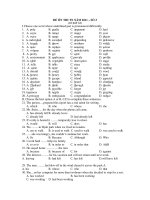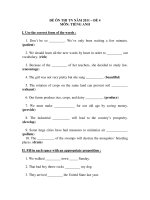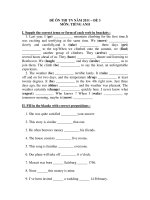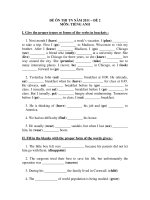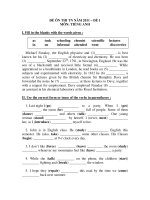ĐỀ ÔN THI TN NĂM 2011 – ĐỀ 17 MÔN: TIẾNG ANH pdf
Bạn đang xem bản rút gọn của tài liệu. Xem và tải ngay bản đầy đủ của tài liệu tại đây (61.32 KB, 4 trang )
ĐỀ ÔN THI TN NĂM 2011 – ĐỀ 17
MÔN: TIẾNG ANH
I. Complete each space with one proper word :
When we have guests to our house, we should (1) __________ very polite
to them, welcome them as warmly (2) __________ possible and try to
behave properly to become a welcome guest if we are (3) __________ to
any formal or informal get-togethers.
It is interesting, and sometimes very important to learn about the
standards of courtesy (4) __________ different cultural areas of the world so
that we (5) __________ practise them well and avoid awkwardness in case
we get a chance to visit a person or a community of unfamiliar social
customs.
The Americans, (6) __________ instance, tend to be informal while
they’re receiving company or coming for a social engagement. On the
whole, women don’t usually shake hands as they are introduced to each (7)
__________ but men do. When a man and a woman are introduced, shaking
hands is up to the (8) __________. And punctuality, which means arriving
on time, is probably one of the most necessary and graceful manners in
public relations. Most people (9) __________ it discourteous and
inconvenient to arrive at an important appointment later (10) __________
the time agreed upon.
II. Use the correct verb tense or form:
1. After leaving school he (study) __________ French in Paris for two
years and then (move) __________ to America, where he now (live)
_________. He (visit) __________ England once or twice and
(know)__________ English well; but (not have)__________ yet the
opportunity of visiting European countries.
2. He will come at once because I (tell) __________ him by phone
that you (need) __________ him urgently. I’m sure he (find) __________
his way easily although he (never visit) __________ this house before.
3. This is the second time you (break) __________ a cup; you
(break) __________ one yesterday. My last servant (never break)
_____________ anything, and you (break) ___________ nearly half the
things in the house.
III. Give the correct prepositions.
1. Better methods of refrigeration depend _______ engineers.
2. Do you have an interest _______ mathematics?
3. It is very kind _______ you to help me.
4. Do you believe _______ God?
5. What is the reason _______ your absence?
6. I’m very proud _______ my father.
7. Are you good _______ repairing cars?
8. I sometimes dream _______ having anew car.
9. Chemistry has provided us _______ synthetics.
10. He has chosen science _______ his career.
IV. Rewrite the following sentences as directed in parentheses :
1. Jane doesn’t speak English as well as Betty.
Betty _______________________________________________________
2. He did his homework, then he went to bed.
After he _____________________________________________________
3. Your house is bigger than mine.
My house ____________________________________________________
4. The lesson is so difficult that we can’t understand it.
It is such ____________________________________________________
5. The weather was so cold that we didn’t go out.
It __________________________________________________________
6. The room was so dark that I couldn’t see anything.
It __________________________________________________________
7. The car is so old that he can’t drive it.
It __________________________________________________________
8. The book is so bad that nobody read it.
It __________________________________________________________
9. The homework is so long that I can’t finish it.
It __________________________________________________________
10. The film was so interesting that we couldn’t miss it.
It __________________________________________________________
11. He usually played tennis on Sundays, but now he doesn’t any more.
He usually used _______________________________________________
12. The British people drive on the left. They are used to it .
The British people are used _____________________________________
13. We have lived in the countryside for many years. We are used to
it.
We are used __________________________________________________
14. They lived in a big city many year ago. Now they live in a small
village.
They used ___________________________________________________
15. She travelled a lot , but now she doesn’t any more.
She used ____________________________________________________
16. My boss doesn’t smoke in his office. He isn’t used to it.
He isn’t used _________________________________________________
17. Japanese men don’t shake hands to say good-bye.
Japanese men aren’t used _______________________________________
18. American women earn their own money. They are used to it.
American women are used ______________________________________
19. Ann enjoyed classical music a lot. But now she likes pop music.
Ann used ____________________________________________________
20. My father smoked a lot. But he gave up smoking a week ago.
My father used _______________________________________________




